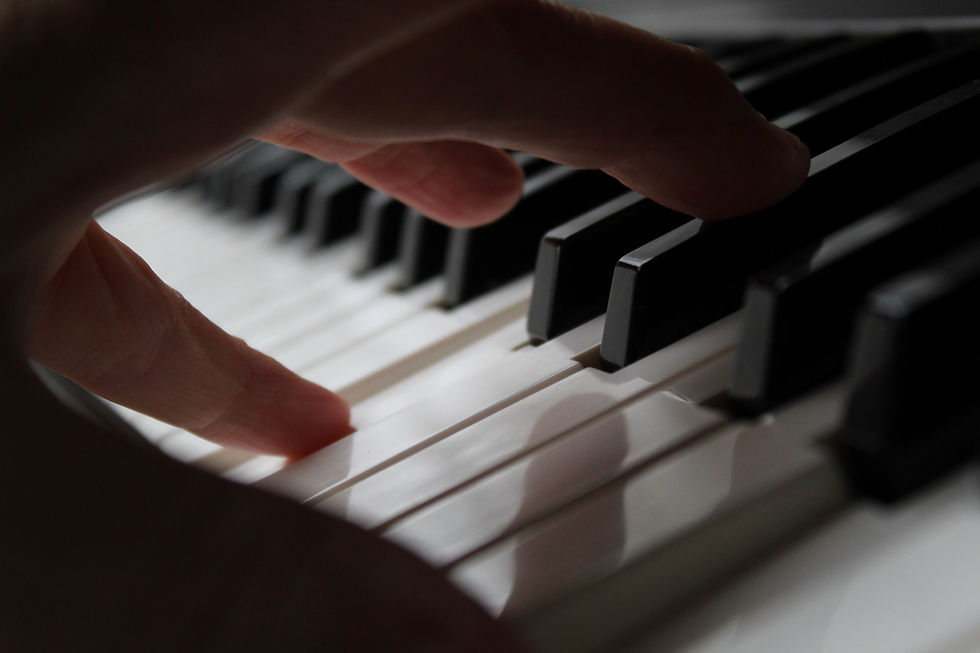Principles of music: play, risk-taking, and faith
- Hannah Hawes
- Dec 13, 2022
- 3 min read
Updated: Feb 15, 2024

All live music involves elements of the unknown, as anything which is created in real-time carries a level of unpredictability. Improvisation, however, involves a unique degree of uncertainty as it is by very nature unplanned. While the unpredictable nature of live music making can be seen as cause for apprehension, our mindset can reframe this uncertainty as unlimited opportunity.
Performance vs. Play
There are two main ways to approach music making. One is by viewing it as a performance — a show or an act which can be executed more or less successfully. The other is by viewing it a form of play. Despite the fact that "play" is the very word we use to describe making music, many people do not see a connection between the two. A performance starts with an objective, and is aimed at imitating or describing what is already known. Play has no objective; rather, it is about discovery, spontaneity, and exploration of the unknown.
A performance is focused on controlling the outcome, foreseeing negative possibilities and preparing for them. Play is unconcerned about the future, instead it is fully absorbed in the present moment. It is not concerned with "playing it safe." This is why children constantly get small injuries. Unhindered play naturally carries risk. However, it stems from the belief that these risks are worth fully experiencing the present moment.
When you approach music making with a mentality of exploration, you give yourself the opportunity to make new discoveries, even when you are playing something you have played many times. Trusting that there is something new to be discovered, and that it is worth discovering, opens you up to inspiration.
Improvising, or creating without preparation, carries greater risk, as you may find yourself uninspired or "drawing a blank." However, it also carries unlimited potential. When you open yourself up to creating something you had not predicted, you allow room for genius and lift the limits on what you can create.
Journey vs. Goal
Oftentimes, for those nervous about a performance, the goal is the end. But when we are focused on the goal of finishing the performance, we do not fully experience the moment as we play. And once we complete our goal, it is over. We do not have anything tangible to show for it, as it is simply an experience — one which we either chose to engage with or not. Although we can record music, it is only a replication of the thing itself; and besides recordings, music really only exists in the moment you are making it. In order to create truly compelling music, you must believe that it is worth doing simply for the sake of doing, not for achieving a goal.
"When we make music we don't do it in order to reach a certain point, such as the end of the composition. If that were the purpose of music then obviously the fastest players would be the best. Also, when we are dancing we are not aiming to arrive at a particular place on the floor as in a journey. When we dance, the journey itself is the point, as when we play music the playing itself is the point." — Alan Watts
Perception vs. Experience
During play, you are not concerned about how you are being perceived or what you look like. You are entirely absorbed in your own creative process. Focusing on the listener's perception of what you create distances you from your own experience; but by being fully immersed in the music, you are better able to respond to what you are hearing and to express something unique to you.
Truly great music never resulted from simply imitating other works. It came from an individual expressing their unique voice and saying something in a way that had never been done before. Creating something true to your experience naturally carries risk; as others may not experience, understand, or appreciate it the way that you do. However, it is the only way to create something truly original.
Although reciting a piece of music can be a meaningful experience, there is something uniquely powerful about communicating your ideas in real time. Learning to share your unique voice can be a process. It requires courage and the faith that speaking authentically about your experience of the world is worthwhile. But the journey to creative freedom may be one of the most rewarding endeavors you undertake.




Comments